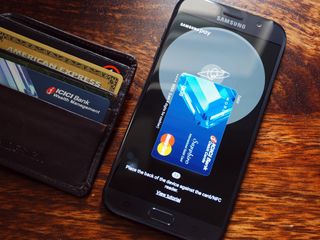Samsung Pay in India: Everything you need to know

Samsung Pay is now live in India, and the digital payments service works at millions of retail stores across the country. With the current uptick in mobile wallets and digital payments, Samsung timed the launch of Samsung Pay in India to perfection and has partnered with leading banks and card issuers to facilitate support for millions of payment cards. Here's what you need to know about using Samsung Pay in India.
How does Samsung Pay work?
The best part about Samsung Pay is that it offers both NFC and Magnetic Secure Transmission (MST), making it compatible with newer payment terminals and older card readers that rely on a magnetic signal from traditional payment cards.
Essentially, Samsung Pay mimics the magnetic signal of a payment card and transmits that information wirelessly via a tiny metal coil located at the back of supported devices (the company acquired the tech from LoopPay). Doing so allows Samsung Pay to work with millions of older payment terminals that can't accept NFC payments.
You'll need to be connected to the internet to set up your payment cards, but you don't need an active connection to use Samsung Pay at retail stores.
Which Samsung devices are supported?
Samsung Pay currently works on the following devices in India:
- Galaxy S8
- Galaxy S8+
- Galaxy S7 edge
- Galaxy S7
- Galaxy Note 5
- Galaxy S6 edge+
- Galaxy A7 (2017)
- Galaxy A5 (2017)
- Galaxy A5 (2016)
- Galaxy A7 (2016)
- Galaxy J7 Pro
Which payment cards support Samsung Pay?
If you have a credit or debit card from Axis Bank, HDFC, ICICI, SBI, or Standard Chartered, you can use Samsung Pay. Credit cards from American Express and Citibank are also compatible with the service. Samsung Pay will pick up more partners in due course of time.
If you're having trouble setting up your card or running into issues while using the service, you can call Samsung's customer service line at 1800-123-7729.
Be an expert in 5 minutes
Get the latest news from Android Central, your trusted companion in the world of Android
What about Paytm and UPI?
Samsung Pay's integration with Paytm means that you can link your mobile wallet to the service and send money or scan a QR code from within the Samsung Pay interface. You'll also be able to top up your Paytm wallet balance, and you don't necessarily need to have the Paytm app installed on your phone to link your wallet to Samsung Pay.
Samsung has also integrated UPI into Samsung Pay, with Axis Bank handling the transfers. With UPI, you'll be able to link your virtual payment addresses from various banks and send or receive money.
Where can I use Samsung Pay in India?
You can use Samsung Pay at most stores that accept card payments. Its compatibility with MST gives Samsung Pay a noticeable advantage over competing payments services Android Pay and Apple Pay.
Samsung is also the first out the gate with its payments solution, and while Android Pay is slated to make its debut at some point later this year, the service relies on NFC exclusively to transmit payment information. A majority of POS systems in India have to be upgraded to be compatible with Android Pay, but you can use Samsung Pay at nearly all retail stores, thanks to MST.
Samsung has partnered with several retail brands to promote Samsung Pay in the country, and even if your store isn't mentioned on the list, you should be able to use the mobile payments service as long as the retail store has a card reader. Samsung Pay also works for online purchases in other markets, but for now, the service is limited to in-store payments in India.
Is Samsung Pay secure?
Samsung Pay relies on either your fingerprint or PIN to authenticate, and the app itself is secured using Samsung's Knox platform. When it comes to transmitting payment information, Samsung uses tokenization, which substitutes your physical card's number with a unique identifier. Your card information isn't revealed, ensuring an added layer of security.
The Samsung Pay app stores your payment data locally, and therefore your card data won't transfer over when you switch devices. You'll have to set up your cards all over again.
Is there a transaction limit for Samsung Pay?
As long as you're making purchases that come under a lakh, you should be fine. To incentivize Samsung Pay, the manufacturer has rolled out several cashback offers that you can avail once you get started with the service. If you've got an eligible device and payment card, you should take a look.
Your take
That's a quick look at what's on offer with Samsung Pay. Are you using the service in India? If so, what do you like the most about it? Share your thoughts in the comments below.
Update, August 2017: This article was updated with details on UPI and new device additions.

Harish Jonnalagadda is a Senior Editor overseeing Asia at Android Central. He leads the site's coverage of Chinese phone brands, contributing to reviews, features, and buying guides. He also writes about storage servers, audio products, and the semiconductor industry. Contact him on Twitter at @chunkynerd.
